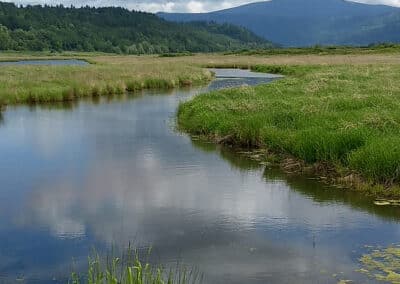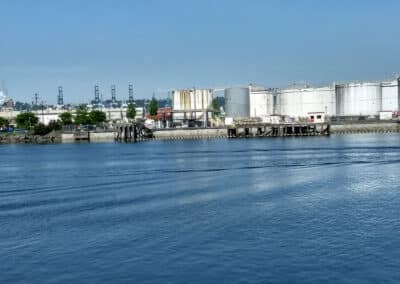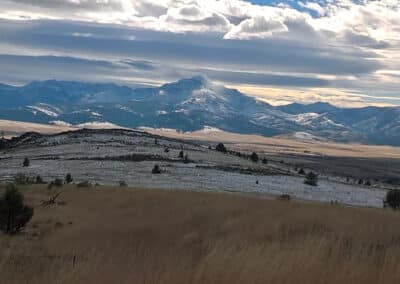Salmon Migration in a Hot Columbia River
Part 1, In Which NWEA Forced EPA to Issue a Plan to Address an Urgent Situation
by Nina Bell • February 8, 2020 •
Twenty-three years. That’s how long it’s taken for EPA to sort-of address just one critical aspect of protecting the salmon and steelhead that attempt to navigate the hot waters of the Columbia River. Now, a rational person wanting to protect migrating salmon from deadly river temperatures would want to get a two-decade head start on growing the trees required to help keep streams cool since trees only grow as fast as they can grow, unlike, say, Trump’s Wall. That would seem to be a good idea. However, good ideas die a speedy death at the EPA, Trump or no Trump.
So here we are 23 years later and Columbia River temperatures have warmed past the level that is safe for salmon. As a result, salmon have come to depend upon the relief offered by patches of cooler water that are created when some tributaries flow into the Columbia, tributaries that can only be kept cool by trees. Recently, EPA published its draft “plan” to protect and restore 14 of these so-called cold–water refuges in Oregon and Washington. Sounds good, right? Wrong!
Two things. Thing one: EPA did not do this willingly, no surprise there. Thing two: the plan is not a plan.
But before we get to a plan that is not a plan, let’s start with the foot-dragging. Not surprisingly, the back story is an NWEA lawsuit. The case, filed in 2005, challenged EPA’s approval of Oregon’s water quality standards for temperature. It also challenged the National Marine Fisheries Service’s (NMFS) agreement that Oregon’s standards would protect threatened and endangered fish.
In order to gain approval for its 20° C (68° F) temperature criterion for migrating salmon in the Columbia and Willamette Rivers, Oregon included a requirement that there be sufficient cold water refuges into which the salmon could escape from the unhealthy 20° C river temperatures.
Back in 2004, when EPA approved Oregon’s 20° C criterion, it said that the Oregon Department of Environmental Quality (DEQ) would make cold water refuges happen through two mechanisms: (1) when the state issued pollution discharge permits; and (2) when it issued TMDL clean-up plans. Now, this was absurd from the outset. There was zero possibility that Oregon DEQ was going to issue permits that required some random city or industrial polluter to protect the temperature of an entire tributary. And EPA knew that Oregon DEQ would not protect refuges in TMDL clean–up plans because, well, EPA approves all of Oregon temperature TMDLs. Facts, as usual, did not get in the way of EPA decision-making.
Fast forward. NWEA won the lawsuit. And NMFS was required to issue a new Biological Opinion evaluating Oregon’s temperature standards. Here’s where it gets interesting.
By the time NMFS issued its new Opinion in 2015, the passage of time had demonstrated that the DEQ had ignored the key provision in its own standards, namely the requirement for cold-water refuges.
As a result, NMFS concluded the cold–water refuge provision of Oregon’s standards was a complete hoax and gave EPA three years to come up with a plan to actually protect and restore the needed refuges along the Columbia River. Good thing we sued NMFS so that it could do the right thing!
Stay tuned for Chapter 2, In Which EPA Completely Drops the Ball and Reaches New Heights of Stupidity



